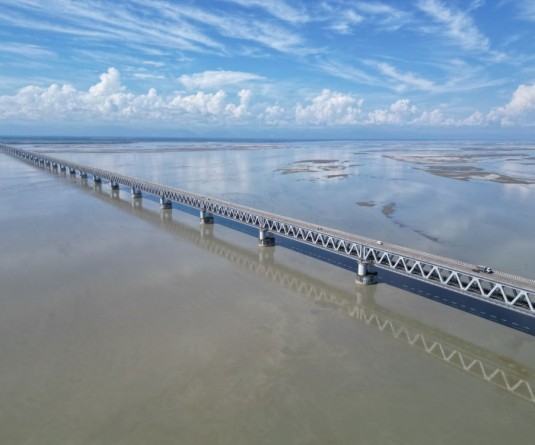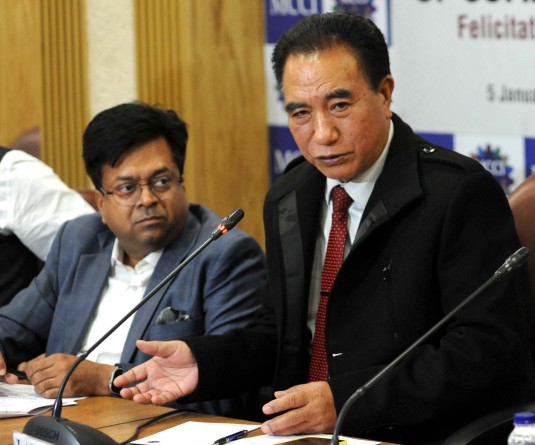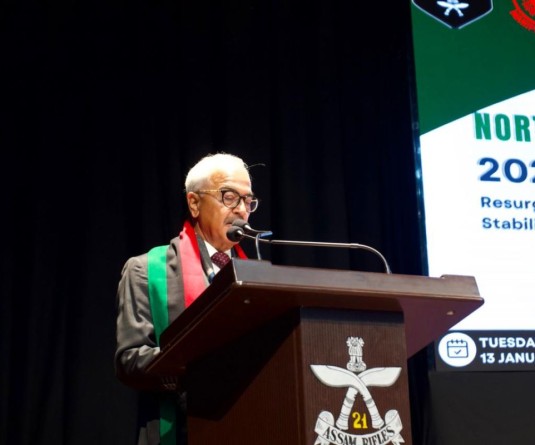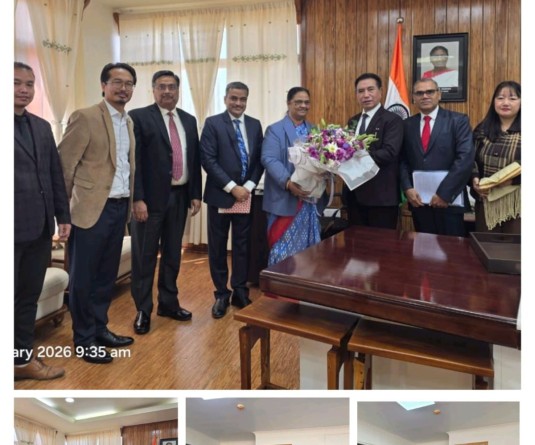
Cultural troupes from Sangtam villages presenting a cultural dance at Mongmong festival at Chungliyimti village on September 6. (Photo Courtesy Sashi Jamir)
Mokokchung | September 7 : Mongmong festival – the premiere festival of the Sangtams – was celebrated at Chungliyimti Village on September 6, 2011 with Additional Chief Secretary & Development Commissioner Alemtemshi Jamir as the chief guest.
A horde of government officials from Mokokchung and Tuensang, village council members from neighboring villages attended the September 6 Mongmong festival at Chungliyimti. The added attraction was the presence of the Ao Students Conference (AKM) and the Ao Senden (Ao Hoho) officials at the programme. Chungliyimti is a historical place for the Ao Naga community. Legends has it that the Ao people evolved from six stones (Longtrok) at Chungliyimti and thereafter they spread to different Ao areas; the six stones are still preserved at the village and it has become an attraction for tourists and researchers.
The chief guest, Alemtemshi Jamir while speaking at the programme, dwelled on the cordial relationship between the Chungliyimti villagers with the Ao people especially the Longsa villagers. He said that being in Chungliyimti was like clearing some debts he owed – that the Chungliyimti villagers always send a cultural troupe to partake in the Ao cultural festival Tsungremong every year at Longsa (the native village of Alemtemshi Jamir), the hospitality shown by the Chungliyimti villagers to him and his father NI Jamir (former minister), and the preservation of the ‘Longtrok’ in the village which is akin to preserving the cultural heritage of the Ao community.
In this connection, Alemtemshi Jamir strongly lamented the deplorable road condition leading to the village (the vehicles have to be hand-pushed up the muddy uphill road); he said that the roads will be back topped within next year and at the same time recommended the gathered Ao leaders to look towards the construction of the road at Chungliyimti since the historical genesis of the Ao people remains at the village and hundreds of Ao people will be visiting Chungliyimti to visit the Longtrok.
He also deeply appreciated the formation of the Chungliyimti village at the historical place, otherwise had there been no village then the area would have been a forest and visitors would have a tough time going to visit the ‘Longrok’ and other Ao historical places in the area.
Also taking a cue at the huge participation of the Ao community in a Sangtam festival, Alemtemshi Jamir lamented the demand of ‘Frontier Nagaland’ and also the ‘autonomous state’ status for the Eastern Nagaland areas. He asserted that the world is becoming a global village and that countries are looking forward to ‘a world without borders’ based on economy and trade. In this regard, he wondered how the people of different tribes can partake in cultural festivals when there is police check gates set-up for different Naga states. He maintained that fragmentation of the Naga family is not ‘a plus game’ but rather ‘a minus game’. He therefore maintained that the people should be astute and think for the future especially in the wake of globalization and urbanization.
Cultural dances, folk songs and guard of honour by the Village Guards to the Chief Guest marked the Mongmong festival at Chungliyimti. Village Council chairmen from Longsa and Ungma villages (Ao villages) also delivered short speeches, while significance of Mongmong festival was pronounced by Tongpang GB of Chungliyimti village.
A horde of government officials from Mokokchung and Tuensang, village council members from neighboring villages attended the September 6 Mongmong festival at Chungliyimti. The added attraction was the presence of the Ao Students Conference (AKM) and the Ao Senden (Ao Hoho) officials at the programme. Chungliyimti is a historical place for the Ao Naga community. Legends has it that the Ao people evolved from six stones (Longtrok) at Chungliyimti and thereafter they spread to different Ao areas; the six stones are still preserved at the village and it has become an attraction for tourists and researchers.
The chief guest, Alemtemshi Jamir while speaking at the programme, dwelled on the cordial relationship between the Chungliyimti villagers with the Ao people especially the Longsa villagers. He said that being in Chungliyimti was like clearing some debts he owed – that the Chungliyimti villagers always send a cultural troupe to partake in the Ao cultural festival Tsungremong every year at Longsa (the native village of Alemtemshi Jamir), the hospitality shown by the Chungliyimti villagers to him and his father NI Jamir (former minister), and the preservation of the ‘Longtrok’ in the village which is akin to preserving the cultural heritage of the Ao community.
In this connection, Alemtemshi Jamir strongly lamented the deplorable road condition leading to the village (the vehicles have to be hand-pushed up the muddy uphill road); he said that the roads will be back topped within next year and at the same time recommended the gathered Ao leaders to look towards the construction of the road at Chungliyimti since the historical genesis of the Ao people remains at the village and hundreds of Ao people will be visiting Chungliyimti to visit the Longtrok.
He also deeply appreciated the formation of the Chungliyimti village at the historical place, otherwise had there been no village then the area would have been a forest and visitors would have a tough time going to visit the ‘Longrok’ and other Ao historical places in the area.
Also taking a cue at the huge participation of the Ao community in a Sangtam festival, Alemtemshi Jamir lamented the demand of ‘Frontier Nagaland’ and also the ‘autonomous state’ status for the Eastern Nagaland areas. He asserted that the world is becoming a global village and that countries are looking forward to ‘a world without borders’ based on economy and trade. In this regard, he wondered how the people of different tribes can partake in cultural festivals when there is police check gates set-up for different Naga states. He maintained that fragmentation of the Naga family is not ‘a plus game’ but rather ‘a minus game’. He therefore maintained that the people should be astute and think for the future especially in the wake of globalization and urbanization.
Cultural dances, folk songs and guard of honour by the Village Guards to the Chief Guest marked the Mongmong festival at Chungliyimti. Village Council chairmen from Longsa and Ungma villages (Ao villages) also delivered short speeches, while significance of Mongmong festival was pronounced by Tongpang GB of Chungliyimti village.






